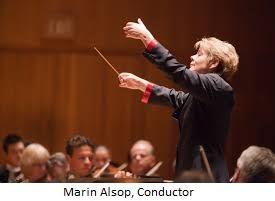This blog post was written by Tara Kosowski (IAC 2014-15). Tara reflects on the leadership styles of two notable women, Malala Yousafzai and Marin Alsop.
The question of leadership and what makes a great leader is one that continually arises across politics, popular culture and the arts. My philosophy professor recently proposed a question of leadership that made me assess my understanding of my role models and leaders. We were asked if activism can only exist if social norms are challenged. In other words, is leadership defined by simply clearing a path, shouting out against the consistent hum of the majority?
I believe that a true leader not solely “breaks the mold” or shatters social norms. A leader must fundamentally personify a clear vision while invoking a pure, emotional response. One can clearly see this definition of effective leadership through the actions of Malala Yousafzai and Marin Alsop.
Though these two women exert leadership in two very separate fields, both Malala and Marin Alsop draw
inspiration from the family values and traditions. For Malala, her father proved a great source of encouragement and leadership. Shaped by an unexpected career in public speaking, he encouraged his daughter to participate in debates. Malala’s inspiration to debate and participate in school undoubtedly leads her to advocate for the power of a woman’s voice.
Likewise, Marin Alsop was encouraged to exceed gender-based expectations in the field of music. Growing up with musician parents and later going on to attend Yale University, Marin never let the male-dominated field of conducting withhold her from becoming the first woman conductor of a major American orchestea. Drawing from a well of emotional support and the idea that potential defies outside influences, Malala and Marin were able to break cultural standards.
The Malala Leadership essay talks about the role of a leader as a translator between emotional ideologies and the audience. Malala emphasizes the traits of, “charisma, sociability and self-awareness.” Her memoir avoids historical redundancies by including a very personal narrative. She elevates her self from a woman’s right activist to a young woman, full of confidence, resilience and bravery. She does not present herself as a heroine, instead drawing a relationship with t the reader through charming tales and witty anecdotes. Her political influence is apparent; what’s truly powerful is her ability to connect with an audience.
Marin Alsop similarly defines her responsibility as a leader as a storyteller. She says, “As the conductor… my responsibility is to galvanize people into caring enough about a piece of music and the way I feel it should be performed to coerce a hundred people into my vision of the interpretation of the piece.” Alsop does not tell people how to feel, rather she provides an instrument for better analysis and depth of emotion.
As an artist and a woman leader, this emotional connection and room for interpretation or dialogue is what I value most in a leader. Just as political activists can hold a room with passionate dialogue, I intend my art to tell a story, to impact the world around me.




